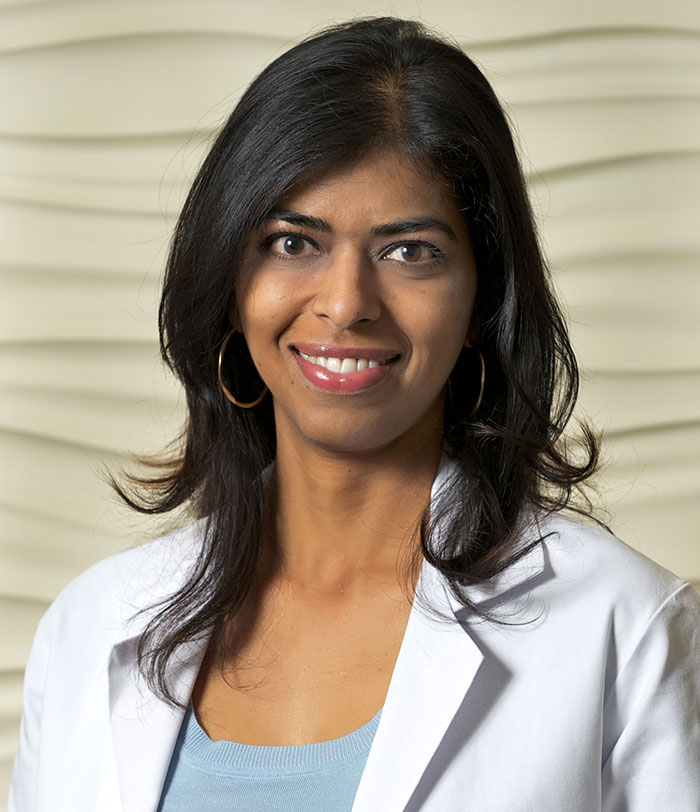
October is Breast Cancer Awareness Month! We sat down with the Jim & Eleanor Randall Breast Center’s Lakshmi Tegulapalle, DO, Medical Director of the Breast Imaging Programfor the latest information about mammograms and the importance of breast health (even during COVID-19).
1. Let’s begin with your most frequently asked question, what protocols are in place at your facility to help protect your patients from COVID-19 at your Facility?
During the COVID-19 pandemic there has been a 62% decrease in screening mammograms across the country and a 52% decrease in breast cancer diagnosis. Cancer has not disappeared; it’s silently growing. We may see an increase in diagnosis of later stage cancers in the coming months. We don’t want to scare women, but we strongly encourage a return to normal screening routines.
Our imaging centers diligently follow CDC and California Health Department guidelines:
● Requiring everyone (staff and patients) to wear masks.
● Social distancing, including spacing out our patient appointments and not allowing walk-in patients.
● Requiring everyone (staff and patients) to be screened for symptoms and fever prior to their appointment or workday. This includes taking temperatures before entering the facility.
● Increased cleaning routines and sanitizer stations.
2. When should I have my first mammogram? And how often should I have one?
At age 40 women with normal risk factors should begin coming in every year for a screening mammogram. Women with a family history or other risk factors should talk with their doctor about what screening regimen works best for them. Bottom line: mammography is effective at reducing breast cancer deaths.
3. If I don’t have a history of breast cancer in my family, do I really still need to start at 40 and/or go annually?
Yes! More than 75% of women who develop breast cancer have no family history of the disease. As we age, our chances of developing breast cancer increase. Annual mammography at age 40 saves lives by about 40%. When cancer is diagnosed at an early stage, the 5-year survival rate is 99%.
4. How do I know if I’m at a higher risk, and if I am, then when should I go and how often?
Discuss your and your family’s health history with your physician. At-risk women should consider starting annual screening mammograms before the age of 40 and possibly supplement with a breast MRI and/or Breast Ultrasound. Risk factors include:
● Family history of breast and/or ovarian cancer, especially in first- or second-degree relatives.
● Personal history of breast cancer.
● Personal or family history of certain genetic mutations, including BRCA1 and BRCA2.
● History of chest radiation therapy under age 30, for example lymphoma treatment.
● History of certain “high-risk” lesions on breast biopsy.
5. If I do have cancer, how likely is it that it will be detected by a mammogram?
No cancer screen is perfect, but mammograms remain the gold standard for detecting breast cancer at an earlier, more treatable stage. Technology continues to improve. 3D Mammography (tomosynthesis) allows doctors to view breast tissue in slices, improving cancer detection while lowering the need for additional tests. Finally, please remember to regularly self-examine and call your doctor if you notice anything abnormal.
6. What does breast density mean and how can that impact mammograms and breast health?
The more dense your breasts are, the more risk you have. Breasts are made of two types of issue: glandular and fatty. More glandular tissue, more likely your breasts are considered dense. The size of breasts doesn’t determine density. Additional screening exams may be better for women with dense breasts. Please talk with your doctor. Together you can decide which exams are right for you.
Today women wear more hats than ever: working, monitoring at-home learning, attending to an always-bustling home, managing the family’s health and safety. Amidst it all, we hope women take the time to prioritize self-care. It can feel like there’s never enough time, but your health and well-being matter. Please call and we will do whatever we can to work with your busy schedule.
For a full list of our COVID-19 protocols, please visit our web site at https://hillmedical.com/locations/jim-eleanor-randall-breast-center/
 English
English Espanol
Espanol 简体中文
简体中文 Tagalog
Tagalog հայերեն
հայերեն 한국인
한국인 Tiếng Việt
Tiếng Việt فارسی
فارسی русский
русский 日本
日本 عربي
عربي
